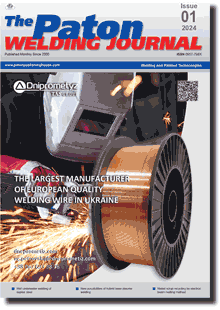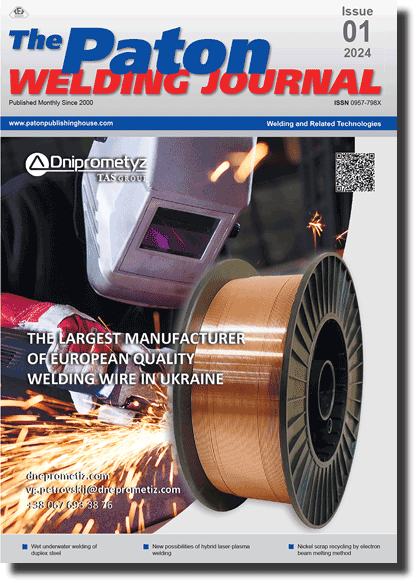| 2024 №01 (04) |
DOI of Article 10.37434/tpwj2024.01.05 |
2024 №01 (06) |

The Paton Welding Journal, 2024, #1, 32-35 pages
Nickel scrap recycling by electron beam melting method
S.V. Akhonin1, V.O. Berezos1, O.G. Erokhin2, O.O. Kotenko2, M.I. Medvedev3, M.G. Lyashenko4
1E.O. Paton Electric Welding Institute of the NASU. 11 Kazymyr Malevych Str., 03150, Kyiv, Ukraine. E-mail: titan.paton@gmail.com22SC «SPC «Titan» of the E.O.Paton Electric Welding Institute of the NAS of Ukraine». 26 Raketna str., 03028, Kyiv, Ukraine. E-mail: titan.paton@gmail.com
3Ukrainian State University of Science and Technologies. 2 Lazaryan Str., 49010, Dnipro, Ukraine. Е-mail: michael.medvedev4747@gmail.com
4«DZST» Ltd. 1 Horyanivska Str., Horyanivske vil., 52035, Dnipropetrovsk region, Ukraine. Е-mail: mirdzst@i.ua
Abstract
Experimental-industrial melting of low-grade nickel scrap was conducted to obtain nickel ingots of not lower than NP2 grade, which are furtheron used to produce semi-finished products in the form of hot- and cold-formed seamless pipes, including capillary, thin-walled and particularly thick-walled, rings, squares, hexagons, etc. It is shown that during electron beam melting a significant removal of impurity elements from the nickel scrap occurred, and metal quality began to correspond to nickel grade not lower than NP2. In order to further study the produced ingot quality, comprehensive research work was performed on manufacturing semi-finished products in the form of elongated soft rods of 40 mm diameter and wire of 3 mm diameter. It was determined that mechanical properties of semi-finished products from EBM nickel fully meet the standard requirements. It is shown that electron beam melting is an efficient method of producing nickel ingots from secondary raw materials, as it allows ensuring a high level of the produced material quality, and the semi-finished product quality fully meets the standard requirements by chemical composition, structure and mechanical properties. 9 Ref., 2 Tabl., 6 Fig.
Keywords: electron beam melting, electron beam unit, nickel, melting, ingot, scrap, refining
Received: 31.10.2023
Received in revised form: 07.12.2023
Accepted: 16.01.2024
References
1. Grytsai, V.P., Bredykhin, V.M., Chervonyi, I.F. et al. (2010) Metallurgy of nonferrous metals: Manual. Pt 5. Book 2, Technology of copper and nickel. Ed. by I.F. Chervonyi. Zaporizhzhiya, ZDIA [in Ukrainian].2. Pozhuev, V.I., Ivashchenko, V.I., Chervonyi, I.F., Grytsai, V.P. (2007) Metallurgy of nonferrous metals: Manual. Pt 1. Ed. by I.F. Chervonyi. Zaporizhzhiya, ZDIA [in Ukrainian].
3. Paton, B.E., Trigub, N.P., Akhonin, S.V., Zhuk, G.V. (2006) Electron beam melting of titanium. Kyiv, Naukova Dumka [in Russian].
4. Dmitrenko, A.E., Kozhevnikov, O.E., Pelykh, V.N. (2003) Application of method of electron beam melting for refining of nickel. Voprosy Atomnoj Nauki i Tekhniki, 5, 162–166 [in Russian].
5. Azhazha, V.M., Zejdlits, M.P., Shevchenko, S.V., Amonenko, V.M. (1973) Influence of chemically active elements on properties of nickel of electron beam melting. Izv. AN SSSR. Metally, 4, 157–159 [in Russian].
6. Trigub, N.P., Berezos, V.A., Kornijchuk, V.D., Mosunov, Yu.A. (2011) Producing of high-quality nickel ingots-slabs by electron beam melting. Advances in Electrometallurgy, 2, 78–81.
7. Movchan, B.A., Tikhonovsky, A.L., Kurapov, Yu.A. (1973) Electron beam melting and refining of metals and alloys. Kyiv, Naukova Dumka [in Russian].
8. Akhonin, S.V., Pikulin, A.N., Berezos, V.A. et al. (2019) Laboratory electron beam unit UE-208M. Sovrem. Elektrometal., 3, 15-22 [in Russian]. https://doi.org/10.15407/sem2019.03.03
9. GOST 13083–77: Rods from nickel and silicon nickel. Specifications.
Suggested Citation
S.V. Akhonin, V.O. Berezos, O.G. Erokhin, O.O. Kotenko, M.I. Medvedev, M.G. Lyashenko (2024) Nickel scrap recycling by electron beam melting method. The Paton Welding J., 01, 32-35.The cost of subscription/purchase order journals or individual articles
| Journal/Currency | Annual Set | 1 issue printed |
1 issue |
one article |
| TPWJ/USD | 384 $ | 32 $ | 26 $ | 13 $ |
| TPWJ/EUR | 348 € | 29 € | 24 € | 12 € |
| TPWJ/UAH | 7200 UAH | 600 UAH | 600 UAH | 280 UAH |
| AS/UAH | 1800 UAH | 300 UAH | 300 UAH | 150 UAH |
| AS/USD | 192 $ | 32 $ | 26 $ | 13 $ |
| AS/EUR | 180 € | 30 € | 25 € | 12 € |
| SEM/UAH | 1200 UAH | 300 UAH | 300 UAH | 150 UAH |
| SEM/USD | 128 $ | 32 $ | 26 $ | 13 $ |
| SEM/EUR | 120 € | 30 € | 25 € | 12 € |
| TDNK/UAH | 1200 UAH | 300 UAH | 300 UAH | 150 UAH |
| TDNK/USD | 128 $ | 32 $ | 26 $ | 13 $ |
| TDNK/EUR | 120 € | 30 € | 25 € | 15 € |
AS = «Automatic Welding» - 6 issues per year;
TPWJ = «PATON WELDING JOURNAL» - 12 issues per year;
SEM = «Electrometallurgy Today» - 4 issues per year;
TDNK = «Technical Diagnostics and Non-Destructive Testing» - 4 issues per year.


